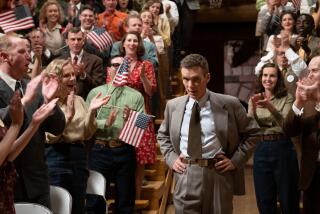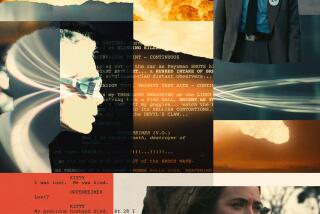Christopher Nolan: all his altered states
Think of Christopher Nolan as a man trying to write a novel while the neighbors -- in this case, the rest of the world’s population -- won’t keep the noise down. The filmmaker doesn’t own a cellphone, has no e-mail account and, in recent weeks, he’s been hiding out at the Paradise Cove trailer park in Malibu to focus on a new script while growing a Hollywood hermit’s beard.
“I don’t really look at the Internet,” the 40-year-old said with an old-soul sigh, “because if I don’t, it gives me more time to think.”
The deep thoughts of writer-director-producer Christopher Nolan have become massive business for Hollywood with his billion-dollar Batman film, “The Dark Knight,” in 2008, and this year’s “Inception,” the ambitious, reality-bending heist film that trails only “Toy Story 3” and “Alice in Wonderland” in worldwide box office for 2010 releases. Now comes the Oscar season, which will begin to show whether this Hitchcock of contemporary genre movies (Nolan’s last four films have been superhero or sci-fi fare) will have better luck with academy voters than the real Hitchcock, whose esteemed and crowd-pleasing output never won him an Oscar in the director category.
Nolan’s grim and epic Gotham City movie did not make the final five in the Academy Awards’ 2009 race for best picture and, in the eyes of many industry observers, that snub led directly to the expansion of the marquee category to 10 nominees for the award show this past March. That “Dark Knight Rule,” as it has been called by some pundits, was intended to widen the field so some well-regarded blockbusters can squeeze in with the traditional art-house fare, and perhaps ease the numbing effect on the Oscars’ television ratings.
With its box-office brawn, strong reviews and elite cast (there were seven former Oscar winners or nominees in the ensemble), “Inception” seems precisely the sort of film that the Oscars leadership would love to see in the best picture mix. And Nolan, too, has become one of the most intriguing filmmakers on the scene, in part because he’s the rare silent type and stately thinker in an industry of much squawk and bluster. With the formal diction of his British boarding-school youth, Nolan also seems to make people around him stand up straighter. “Inception” star Joseph Gordon-Levitt, for instance, still can’t quite refer to the filmmaker with first-name casualness.
“Mr. Nolan doesn’t cater to the executives at some big company, he really does what he wants to with a film,” Gordon-Levitt said. “He manages to do it within the current big system because he’s that good and he can, but ‘Inception’ and his films aren’t developed by committee. And it wasn’t him saying, ‘How am I going to make a big summer hit?’ ‘Inception’ was about him following his own fascinations.”
Nolan burst onto the scene in 2000 with the twisty cinematic riddles of “Memento” — which earned an Oscar nomination for screenplay for the filmmaker and his brother, Jonathan. The sibling team is together again and working by the sea on the third Batman film, “The Dark Knight Rises.” All of Nolan’s movies are produced by his wife, Emma Thomas, and they will be expanding their cape ventures with a new Superman film for Warner Bros., although Nolan’s role on that high-profile project is as producer and Zack Snyder (“300” and the upcoming “Sucker Punch”) will be directing.
“Inception” was Nolan’s seventh feature film and perhaps his most personal piece — he wrote the script as the latest version of a tale he first put to paper more than 15 years ago. The psychological thriller with sci-fi underpinnings and a globetrotting sweep stars Leonardo DiCaprio as Dominic Cobb, a corporate espionage specialist who might be considered a dream thief. Cobb and his team, which includes newcomer Ariadne ( Ellen Page), steal secrets by connecting their dreams with their tycoon targets. Cobb, however, is also slipping into a personal nightmare and losing his hold on reality.
“The nature of reality and dream, of illusion, those have been topics for fascination for centuries and for me, growing up, dreams were something I thought about a lot,” Nolan said. “The clash of objective reality with our subjective view of the world, that’s pretty interesting stuff. This is something I thought about doing for a very long time. I’ve been thinking about it off and on since I was about 16. It was the approach I wanted to take to an almost alternate reality — approaching the dream life as another state of reality. And one that in certain circumstances can be manipulated.”
The Warner Bros. release made $824 million in global box office and is expected to be a powerhouse release on Blu-ray and DVD for the holidays (it just hit store shelves), all despite early studio anxieties that the film might be too complex or surreal to connect with a mass audience. Studio executives were happy when Nolan would tell interviewers of the film’s James Bond-informed action. They were far less enthused for moviegoers in the heartland to hear him talk about how Page’s character shares the name of the Cretan princess who helped Theseus escape the Minotaur’s labyrinth.
In an era when other filmmakers are taking ancient myth and turning it into popcorn adventure ( “Clash of the Titans,” “300,” “Percy Jackson and the Lightning Thief”), Nolan is taking contemporary adventure tropes and reframing them through literary ambition, psychological tintings and stately old-school film craft. The man who grew up splitting his youth between Chicago and London and seems informed by both heritages has become an unlikely specialist — an art-house auteur who makes grim blockbusters for the graphic-novel and video-game generation.
“Inception” was especially popular with tech-savvy young thinkers who saw it as an of-the-moment statement on pixelated life and virtual reality. That’s not really the way Nolan is wired — no iPhone, remember? — but he says the most compelling sci-fi isn’t really about hardware, it’s about the humans inside the machinery of the story. “It’s ideas, characters and stories that resonate, not the trappings. But if you can combine those with the large canvas of film, the scale of it and the visual power of it, that can be something very special.”
As a filmmaker, one of the most interesting things about Nolan is his general resistance to the use of CG effects unless it’s absolutely necessary or (in the case of erasing stunt-team harnesses and tether lines) it provides more safety for cast and crew. Essentially, Nolan’s dreams are too big for a computer hard drive. “Inception” was filmed in six countries and on massive sets in Cardington, England, and on the Warner Bros. studio lot — and instead of relying on mouse-pad artists to create “Inception’s” spinning rooms, runaway trains, levitating dreamers and flooded castles, Nolan turned to old-school mechanical savants such as Chris Corbould, the special effects supervisor who came into the project with 11 James Bond films on his résumé, and director of photography Wally Pfister, a former television news cameraman.
It brought a sort of Old Hollywood scale and magic to the set — DiCaprio called it “a classic approach to filmmaking and craft” — and also the high-stakes pressure of capturing action in the real world where there’s no keyboard and “escape,” “back” or “delete” button. None of this is meant to paint Nolan as a Luddite. “Inception” certainly used state-of-the-art CG effects — a filmmaker can’t fold a city skyline as if it were from the pages of a pop-up book without a considerable amount of digital wizardry — and the filmmaker is intrigued and involved in the plan to make an “Inception” video game. But Nolan also admits that it’s “a point of pride” for him to resist what he views as Hollywood’s new over-reliance on pixel magic.
“I want to be proud of the fact that at the end of each movie we haven’t taken any shortcuts to use modern technology simply to make our lives easier or not bothering with things,” Nolan said. “These things are taken to the extreme. If there’s a ladder or a cherry picker in the back of a shot, people will paint it out later rather than just moving it. Really, it happens all the time. As filmmakers working on a large scale
with large budgets, we have a lot of techniques at our disposal and I just want to feel as if we used each technique for what it’s best for.”
Nolan added: “Doing things on a grand scale in camera keeps it very exciting for all of us, the actors included. I like the fact that these aren’t things that you can repeat endlessly. It focuses everybody’s mind on making that big shot work, just achieving that and then moving on to the next thing. There’s a precision that results because everybody had to think very carefully about what they’re going to do at the moment.”
The filmmaker’s disciplined eye and intense expectations may well put him on the level of a James Cameron and Tim Burton as far as Hollywood’s most distinctive dreamers of blockbusters, but his actors say it is the small-scale insights they remember.
“He’s very concerned with instilling every moment with a human honesty and organic life,” Gordon-Levitt said. “I never felt like I was playing a device in a heist movie. He would ask me stuff, from big things to little things. ‘You’re carrying a bag in this scene. What’s in the bag?’ That’s the kind of thing you probably should know to be really in the role but you wouldn’t even think of that in a typical action movie — ‘I have a tote bag, it’s my prop.’ He doesn’t want you to think in a two-dimensional way. He doesn’t let things go by unconsidered and that’s why he’s Christopher Nolan.”
More to Read
The biggest entertainment stories
Get our big stories about Hollywood, film, television, music, arts, culture and more right in your inbox as soon as they publish.
You may occasionally receive promotional content from the Los Angeles Times.






